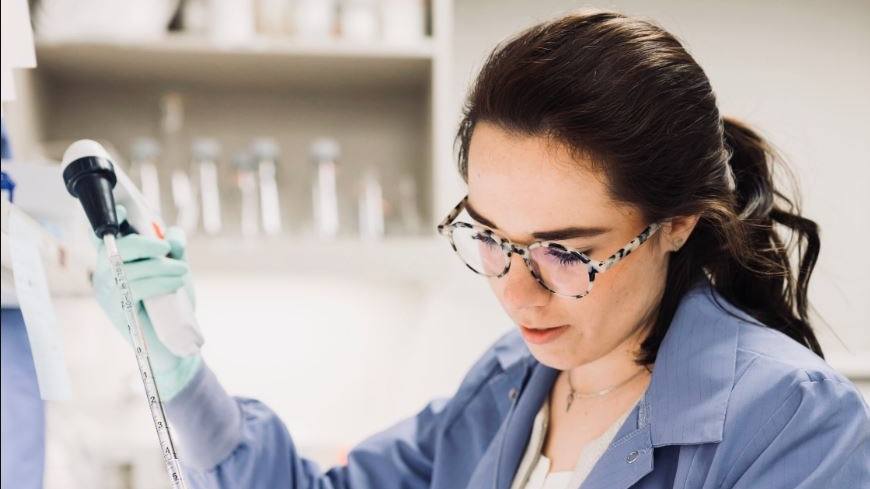-
News Releases
Experience with mentors inspires Mayo Clinic fellow to help other medical trainees

JACKSONVILLE, Fla. — As a medical student in Mexico, Paola Suarez-Meade, M.D., wanted a career that included research and clinical work. But among her teachers, the most common career paths involved making a choice: treat patients or study disease. A fascination with stem cells prompted her to seek out a research opportunity in the U.S. with neurosurgeon Alfredo Quinones-Hinojosa, M.D., who runs the Brain Tumor Stem Cell Laboratory at Mayo Clinic. Observing his work—treating patients with brain cancer while running a lab to uncover the secrets of devastating tumors like glioblastomas—she realized she could craft a career combining both of her passions.
"I want to help people through my research — you can help millions if you find something interesting — as well as each of my patients, one by one," Dr. Suarez-Meade says. "I can help more people if I do both."
Her path illustrates the important role mentors play in shaping the next generation of clinicians and scientists. Following her research opportunity with Dr. Quinones-Hinojosa, who is chair of neurosurgery at Mayo Clinic in Florida and is the William J. and Charles H. Mayo Professor and Chair of Neurologic Surgery at Mayo Clinic, Dr. Suarez-Meade returned to Mexico City for her clinical internship and served as chief intern at Médica Sur Hospital, a Mayo Clinic Care Network member. Now, she is back in Dr. Quinones-Hinojosa's lab, building her research skills as a postdoctoral fellow and studying brain cancer. She is also helping trainees navigate the next steps of their careers in the U.S. and through Mayo's connection to Medica Sur.
"A successful career, for me, will mean being able to give back to the world of neuroscience and medicine, making discoveries that can be applied to my future patients and helping other scientists and medical students grow," she says.
At Mayo, Dr. Suarez-Meade is mentored in clinical research by Dr. Quinones-Hinojosa and Kaisorn Chaichana, M.D., as she gathers data in the operating room for brain-mapping studies to improve surgeries. She is also investigating how glioblastoma cells proliferate and migrate to invade healthy tissue, with guidance from Hugo Guerrero-Cazares, M.D., Ph.D., and Paula Valentina Schiapparelli, Ph.D.
"Being able to go to the operating room, see the surgeons interact with the patients, participate in clinical research — all really gives special meaning to why we're doing the basic science," she says.
In one project, she is testing a new microfluidic technology developed with Johns Hopkins and patented by Dr. Quinones-Hinojosa's lab. The tool can distinguish cells that move readily through narrow channels, like those that exist in the brain, and already has enabled the lab to identify several genes associated with aggressive brain cancer. Dr. Suarez-Meade is determining whether this technology can be used alongside brain surgery to understand each patient's disease and help doctors choose the most effective chemotherapies.
Dr. Suarez-Meade also has become a mentor for other scientists-in-training, including Emily Norton, a Ph.D. candidate in the neuroscience program at Mayo Clinic Graduate School of Biomedical Sciences. The two worked together on a published study and have another underway. Norton, who studies the interaction of brain tumors with stem cells of the brain, is emphatic about Dr. Suarez-Meade's powerful influence.
"Her never-ending enthusiasm and knowledge about tying basic science to clinical problems has helped me shape my career goals to work in translational neuro-oncology research," Norton says.
Dr. Suarez-Meade plans to apply for a neurosurgery residency, continue her research and eventually become a clinician-scientist with her own lab that studies glioblastoma. She envisions a lab with the same foundational approaches she has experienced at Mayo Clinic — a combination of patient care, research and education — and the same culture of scientific collaboration and support.
"My mentors are always asking what's the next step, and they help me get there. That's been so important, and I want that for the people I train," she says. "I want them to do great things."
###
About Mayo Clinic
Mayo Clinic is a nonprofit organization committed to innovation in clinical practice, education and research, and providing compassion, expertise and answers to everyone who needs healing. Visit the Mayo Clinic News Network for additional Mayo Clinic news.
Media contact:
- Sharon Theimer, Mayo Clinic Public Affairs, newsbureau@mayo.edu







